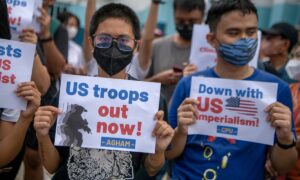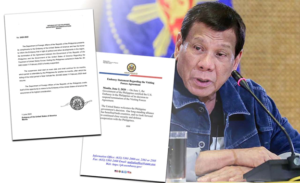THE first-ever trilateral summit between the United States, Japan and the Philippines will take place in April in the United States. Preparations for the summit between Japanese Prime Minister Fumio Kishida, US President Joe Biden and Philippine President Ferdinand Marcos Jr. have been scheduled for April 11 in Washington.
During the summit, discussions will revolve around strategies for fortifying the partnership among the three nations in critical areas such as maritime security, cyber defense, economic stability, safeguarding strategic infrastructure and ensuring energy resource security.
Notably, the United States has intensified its bilateral and trilateral defense and military cooperation with Japan and the Philippines in response to China’s territorial claims and perceived military expansions in the East and South China Seas, and near Taiwan.Filipino fashion designer files case vs vlogger
Also, the cooperation includes combined maritime activities and joint naval exercises between the three countries, and there’s a perceived shared commitment to uphold the July 12, 2016, Arbitral Award on the South China Sea.
Implications
The trilateral summit and US-Japan-Philippines trilateral defense pact underscore the geopolitical dynamics that echo Cold War-era bloc confrontations, albeit in a contemporary setting.
This newly formed defense and military triad of the US, Japan and the Philippines is another aggressive approach to foreign relations, a Cold War tactic, and a narrower security-centric effort of the US to preserve its hegemony and dominance in the Asia-Pacific region. It is also an attempt to contain, counter, isolate and single out China.
The alliance could potentially exacerbate regional tensions, fomenting divisions and confrontation among Asian countries. China, Russia and possibly other countries may respond with countermeasures that will further escalate the tension in the region. It may also provoke an arms race and risk an armed conflict, endangering the peace and stability of the Asia-Pacific region.
In the area of diplomacy, the trilateral alliance may hinder diplomatic efforts to engage China in the South China Sea (SCS) dispute as far as the Philippines is concerned. China may perceive such a trilateral pact as an attempt to contain its influence and challenge its regional aspirations. It also may perceive the trilateral pact as a threat to itself.
These scenarios may lead to a cessation of negotiations and diplomacy, which are important for addressing regional and global governance issues and disputes, such as the dispute in the contested waters of the SCS. Also, these scenarios could lead to increased tensions between the pact members and China, affecting economic, diplomatic and security relations among the parties involved and adversely impacting regional countries.
Furthermore, the creation of this trilateral defense pact may further accelerate and aggravate the growing major rivalry, competition and division between China and the US in the region in the area of security, defense and military affairs, further intensifying the already polarized global power dynamics and world order, creating mutually exclusive power blocs with alliances.
Such polarization may not only hinder cooperation on global challenges that require collective action, such as climate change, global food insecurity problems or pandemics, but may also steer the dawn of Cold War version 2.0, escalating great power competition, rivalry and bloc confrontation.
Considering all these, a trilateral security, defense and military alliance between the US, Japan and the Philippines may result in unpredictable outcomes that could destabilize the region, inadvertently provoke conflicts or create new security threats.
National interests and sovereignty
On the other hand, one of the foundational concerns with a potential defense pact between the Philippines, the US and Japan is the entanglement of the Philippines in alliances that serve the strategic interests of more powerful countries. The Philippines put itself at risk in making autonomous decisions that align with its national interests.
The presence of foreign military forces and infrastructure on Philippine soil through EDCA (Enhanced Defense Cooperation Agreement), VFA (US-Philippines Visiting Forces Agreement), Sovfa (Philippines-Australia Status of Visiting Forces Agreement) and now this RAA (Reciprocal Access Agreement) between the Philippines and Japan further exacerbates this issue, as it may lead to situations where a Western alliance-led and prompted by the US could effectively undermine the self-determination the nation has long fought to secure since the time of Spanish, American and Japanese colonization until this very day.
On another note, the EDCA, the RAA and the trilateral defense pact may exacerbate tensions in the Asia-Pacific region, which is already rife with territorial disputes and power plays. Such agreements can be interpreted as provocative, potentially sparking a regional arms race or causing diplomatic strains, potentially inviting reciprocal military posturing and signaling an escalation of the region’s US and Japan-China major rivalry and competition.
For Asean, a bloc that prides itself on diplomacy, this could be detrimental to regional equilibrium and its centrality in managing regional security issues. With its unique position and history of territorial disputes in the SCS, the Philippines could be at the center of a geopolitical tug-of-war that may not serve its long-term strategic national interests.
Likewise, the shadow of increased military presence does not necessarily forecast a more secure future for the Philippines. The militarization of the Philippines through VFA, EDCA, Sovfa and now the RAA will only lead to a security dilemma, where one state’s defensive enhancements are perceived as a threat by others, prompting a cycle of military buildup that could undermine peace and security in the region.
Moreover, the defense pact between the Philippines, the US and Japan could disrupt the existing state of affairs, provoking a realignment of loyalties among regional countries. Furthermore, such a pact could be seen as a provocation by regional actors not part of the agreement, chiefly China, which may view it as a containment strategy, thus potentially inflaming regional tensions.
Conclusion
Without a doubt, the possibility of a defense pact between the Philippines, Japan and the US presents more than just a strategic opportunity; it is a proposition laden with risks to national sovereignty, regional stability, and the Asean’s centrality and collective security.
In the face of such an alliance, the Philippines must carefully consider its position, mindful of its historic struggle for sovereignty and the potential repercussions for the Asia-Pacific region. The path toward a secure and peaceful regional environment lies not in the proliferation of military and defense pacts but in the commitment to diplomatic engagement, mutual respect and the unwavering pursuit of peace and harmony.
In doing so, fostering a discourse that transcends immediate strategic interests and considers the long-term vision of a stable, independent and peaceful region is essential.
Only through such a comprehensive and reflective approach can the true interests of the Philippines and its neighbors be secured. As history has often shown, nations have best secured their future through peaceful collaboration, not through preparing for war.
Source: The Manila Times
https://www.manilatimes.net/2024/03/23/opinion/columns/examining-the-dynamics-of-the-us-japan-philippines-defense-pact-amid-rising-geopolitical-tensions/1938004



